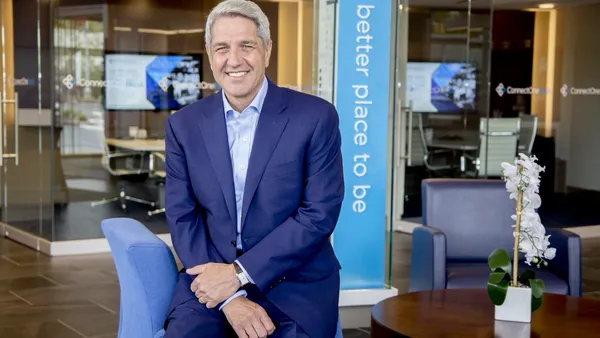UPDATE: June 23, 2021: Partner Colorado Credit Union tapped its CFO, Doug Fagan, to become its next president and CEO on July 1, the institution said in a press release.
"I am very honored to be given the opportunity to lead the credit union," Fagan said in the release. "I have big shoes to fill but I am excited and ready to continue the growth and success of Partner Colorado."
Those big shoes belong to Sundie Seefried, who is stepping down to lead Safe Harbor Financial, an entity that combines the credit union’s cannabis banking arm with its division that licenses those services to other financial institutions.
Before becoming Partner Colorado's CFO in 2017, Fagan served as senior vice president of finance at MidFlorida Credit Union and was vice president of finance at Bay Gulf Credit Union until it merged with MidFlorida in 2010.
Linda Head, chairperson of Partner Colorado's board of directors, noted Fagan's "commitment" to the credit union's core values, adding she is confident he "will continue to ensure quality service to members and community engagement."
"We look forward to seeing the continued growth and success of the credit union under his leadership," Head said.
------
After 20 years as CEO of Partner Colorado Credit Union, Sundie Seefried will step down in July to lead a new cannabis banking company called Safe Harbor Financial, an entity formed through the combination of the credit union’s cannabis banking arm and its division that licenses those services to other financial institutions.
Partner Colorado will be majority owner of Safe Harbor, and all cannabis-related funds will continue to flow through the Arvada, Colorado-based credit union.
Partner Colorado chose to separate the entity from the credit union to devote more resources to the growing market and ensure the credit union’s consumer division is not neglected, said Seefried, who has spearheaded the institution’s cannabis banking efforts since 2014, the same year state-licensed retail sales of cannabis began in Colorado.
"A lot of my attention, strategically, has been distracted by the cannabis banking program. In fact, so many people think I just run Safe Harbor Private Banking and don't realize I actually am the CEO of Partner Colorado Credit Union with 36,000 consumer members," she said.
Continuity of management
When her contract came up for renewal last fall, Seefried approached Partner Colorado's board with the proposal to solely focus on the cannabis banking arm, she said.
"Because I manage that program, my time has to be spent on continually developing this program and evolving it with this emerging market, which takes my time away from the consumer end of the business," Seefried said.
The cannabis banking program and its compliance requirements under the Bank Secrecy Act (BSA) dominated the boardroom conversation, she said.
"By focusing so much on cannabis, I couldn't spend any time really focusing on new consumer products and services and branches," she said. "Strategically, I'm not doing the credit union any favor by focusing totally on cannabis and maybe missing other opportunities on which I could be focusing."
Marijuana’s federal designation as a Schedule 1 drug means banks and credit unions face significant legal, operational and regulatory risks — and the aforementioned compliance demands — if they choose to extend services to cannabis-related businesses. As a result, many financial institutions are reluctant to enter the space.
"The amount of work necessary to manage that BSA risk is expensive. And the resources are demanding, in terms of the monetary system that you have to purchase. And it's such a big project to even understand the industry," Seefried said.
Continuity of management is vital to maintaining institutional knowledge, Seefried said.
"What happens if you really train your management and then they become very valuable in the market, and all of a sudden they're leaving the organization and you're losing all that experience?" she said. "You've got to have long-term continuity of management to make sure that once you learn and implement something, you still have sufficiently trained staff behind them."
Seefried has dedicated the last seven years to the credit union’s cannabis program — even delaying her planned 2014 retirement.
"I promised the board I would not leave them in a situation when we took this on where I thought the risk wasn't fully mitigated for them as a credit union," she said. "So I have to finish the project. And I have to get to the point where I'm comfortable leaving it behind me to staff. I have now 35 employees who do nothing but cannabis-type business. I'm still not at the point where any of them are ready to take it on full time."
Expansion plans
Merging the credit union’s two divisions and narrowing Seefried’s focus also positions the program to expand, a prospect the credit union expects in the next year, she said.
Safe Harbor Financial’s first product will be lending and commercial real estate loans, Seefried said.
"[Cannabis businesses] still don't have a lot of access to capital without having to give up equity. And they want access to mainstream lending," she said.
Outside of the cannabis space, Seefried said she is also considering providing services to the cryptocurrency sector.
"I look at crypto in the same manner that I looked at cannabis seven years ago," she said. "One of the biggest factors they need to actually legitimize virtual currency is to get into the financial system in an organized, accountable, transparent way."
Seefried said she believes the compliance experience the credit union has gained through banking cannabis companies can also be applied to the crypto market.
"Somebody gave me a sideways glance and said, 'You can't do cannabis and crypto, that's too much risk.' But my argument to that is, we did cannabis and we did it thoroughly," she said. "We think we have the compliance program to a good state of stability here. Wouldn't it be better for somebody who's going to tackle a high-risk market like cannabis to move into another high-risk market and unknown market like crypto, knowing what it's going to take to manage the BSA obligation? And it'll allow us to move through it in a smoother and safer way."
Seefried’s ambitions for the new company don’t stop at banking the cannabis and crypto markets — she’s also considering psilocybins, or psychedelic mushrooms.
"I know people are going to find this really distasteful, but there's a business reason," said Seefried. "Mushrooms are starting to go down the same path that cannabis did."
Denver became the first city in the country to decriminalize psychedelic mushrooms in 2019, and a New York lawmaker recently introduced legislation that would do the same.
"Cannabis companies see this as a natural progression or addition to their present highly regulated business," Seefried said. "They already know how to do business under that kind of regulatory scrutiny of these types of products and they're asking us already, 'If we go down this path, are you going to continue to bank us?'"
Jobs open
All 35 employees in Partner Colorado’s cannabis banking division will be moving to the new entity, and Seefried said she plans to hire at least five more by year’s end.
"That makes me feel really good that I have that kind of support behind me already," Seefried said. "We're definitely going to need to hire some additional talent, perhaps in the lending area and definitely in the crypto area, if we go down that path. We’ll need somebody who really understands virtual currency. It's not a talent that’s easily grown from the inside and it’s faster to market if we bring in the experts."























